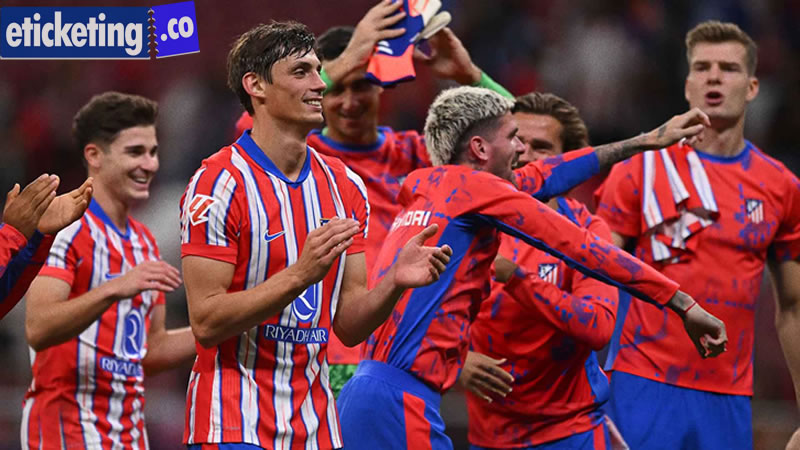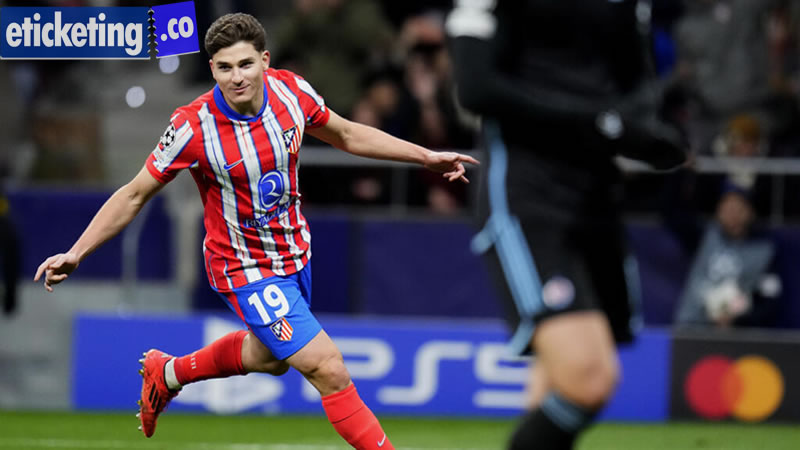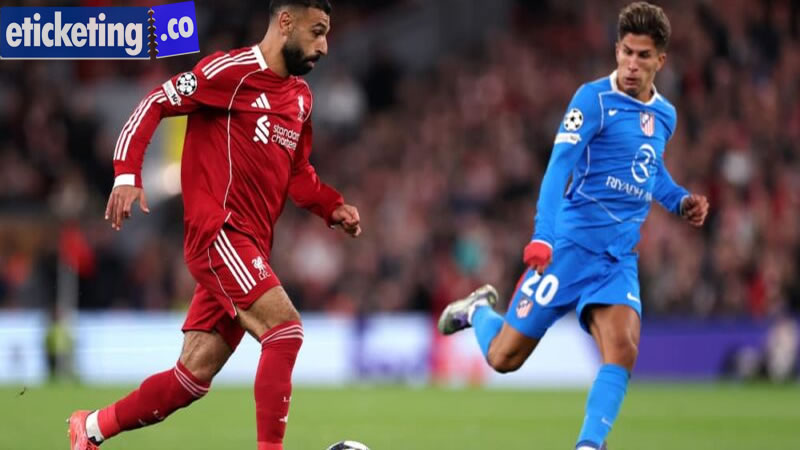The Champions League Final 2026 campaign witnessed another powerful statement from Arsenal. As UEFA’s game insights unit took a closer look at their commanding 4-0 triumph over Atlético de Madrid on Matchday 3. The match stood out as one of the most dominant performances in this season’s competition, showcasing Arsenal’s tactical sharpness and clinical edge.
Eticketing.co provides football fans with the opportunity to purchase Champions League Final Tickets at unbeatable prices. Fans can take advantage of exclusive discounts, ensuring they secure their seats for the biggest match of the year without breaking the bank. Explore a seamless ticket- experience and enjoy the thrill of the Last battle with us.

According to analysis, the London club’s ability to completely dismantle Atlético during a breathtaking 13-minute spell from the 57th to the 70th minute. Highlighted both their attacking rhythm and relentless pressing. What particularly intrigued UEFA’s analysts was Arsenal’s remarkable proficiency from set-pieces. With two of their four goals stemming from well-rehearsed dead-ball situations. Underscoring their precision, preparation, and superiority in key moments against one of Europe’s traditionally most resilient defences.
Atlético’s Tactical Discipline in the Champions League Final 2026 Encounter
Before focusing on Arsenal’s attacking brilliance, Atlético de Madrid’s defensive structure deserves recognition. For the resilience they displayed in this Champions League Final 2026 campaign clash. The visitors adopted a compact and deep defensive shape. Forcing Arsenal to search for openings in wide areas rather than through the middle. During the first half, Atlético executed their low block with precision, closing down spaces and shifting intelligently as a unit.
Defensive Identity and Coaching Philosophy Highlighted in Champions League Final 2026 Review
Technical Observer Pål Arne Johansen emphasized that Atlético’s defensive performance mirrored their long-standing tactical identity. A key aspect often highlighted in Champions League Final 2026 analyses. Despite the team’s shifting formations, their core philosophy remained unchanged centered on maintaining defensive control. Johansen explained that for Diego Simeone, the foundation of success lies in constructing a system that guarantees stability and discipline before creativity.
Restricting Arsenal’s Threat Before the Champions League Final 2026 Breakthrough
During the first half of this Champions League Final 2026 campaign contest. Atlético de Madrid successfully limited Arsenal’s attacking potency. Restricting them to an expected goals (xG) total of just 0.51. Their disciplined shape and well-organised lines forced Arsenal to circulate the ball laterally. making it difficult to find penetrating passes through the central corridor. This defensive mastery forced Arsenal’s creative players. Such as Martin Ødegaard and Declan Rice, to operate from deeper positions with limited space.
Arsenal’s Tactical Rotations Define Champions League Final 2026 Second-Half Shift
Following their early second-half breakthrough, Arsenal’s tactical evolution was evident during this crucial stage of the Champions League Final 2026 journey. Mikel Arteta’s side transitioned from patient possession to incisive. Vertical football that overwhelmed Atlético’s defensive unit. UEFA’s video analysis revealed increased forward passing sequences. More one-on-one duels, and improved fluidity in positional rotations. A standout moment involved Martín Zubimendi’s deft skill, which initiated a move leading to one of Arsenal’s decisive goals. Johansen highlighted that Arsenal’s quicker, more frequent rotations. Especially involving midfielders and full-backs—helped unlock the spaces between Atlético’s compact lines. Also Read Champions League Final 2026 Staple

Set-Piece Excellence Reinforced in Champions League Final 2026 Tactical Breakdown
Set-pieces once again emerged as a defining feature in Arsenal’s Champions League Final 2026 performance review. Highlighting their status as one of Europe’s most well-prepared teams in dead-ball situations. Mikel Arteta himself acknowledged after the game that the dead ball is one of those tools against a block that is so compact, so organised. And Arsenal proved just how effectively they could exploit it.
Two of their four goals originated from meticulously rehearsed routines designed by set-piece coach Nicolas Jover. Gabriel’s opening goal came from a well-delivered cross by Declan Rice, complemented by deep runs that destabilized Atlético’s marking. The fourth goal stemmed from a cleverly executed corner routine in which Martinelli’s movement distracted defenders. Freeing Gabriel for a clean header at the back post. These moments underscored how precision, planning, and execution from set pieces have become vital pillars of Arsenal’s modern tactical identity under Arteta’s leadership.
The Role of Momentum in Arsenal’s Goal Flurry
UEFA’s game insights unit highlighted a fascinating trend observed in the competition. Quick follow-up goals within minutes of scoring. Arsenal’s sudden burst of goals against Atlético de Madrid fit this emerging pattern perfectly. Of the 200 goals recorded in the group stage thus far, 32 were followed by another within five minutes often by the same team. This pattern might suggest a psychological factor at play, where teams gain confidence and intensity immediately after scoring.
Eticketing.co gives football supporters the opportunity to buy Champions League Final 2026 Tickets at unbeatable prices. Fans can take advantage of exclusive offers, ensuring they reserve their seats for the most important match of the year without straining their budget. Enjoy a streamlined ticket-buying experience and feel the excitement of the final showdown with us.

Arsenal demonstrated this effect vividly during their 13-minute onslaught. Showing how momentum and emotional surge can dismantle even well-drilled defensive setups. Arteta’s players displayed ruthless efficiency, capitalizing on every transition opportunity. This ability to sustain attacking pressure after breakthroughs not only reflects strong mental conditioning. But also, indicates a well-rehearsed tactical framework designed to overwhelm opponents during their most vulnerable moments following a conceded goal.
Mikel Arteta’s Tactical Flexibility and Coaching Detail
Mikel Arteta’s influence on Arsenal’s evolution continues to be evident in their sophisticated tactical adjustments and relentless pursuit of improvement. His team displayed versatility in both structure and execution. Reflecting hours of detailed preparation. Arteta emphasized that players such as Myles Lewis-Skelly bring unique qualities driving the ball forward. Drawing defenders in, and releasing passes at the perfect moment. This blend of youth-driven energy and experienced control underpins Arsenal’s success against compact teams like Atlético.
By balancing creativity with discipline, Arteta’s system allows players to improvise within an organised framework. The second half against Atlético was a testament to this philosophy: players rotated intelligently.
Giuliano Simeone’s Dual Role and Atlético’s Tactical Response
Giuliano Simeone’s disciplined defensive contribution illustrated Atlético’s adaptability under pressure. His ability to transition seamlessly from an attacking winger into a defensive auxiliary showcased the tactical awareness ingrained in Simeone’s sides. Whenever Arsenal’s Lewis-Skelly advanced high, Simeone tucked into the defensive line. Ensuring numerical stability at the back. Similarly, Nicolás González performed an equivalent role on the opposite flank, offering additional cover when crosses were delivered from the right.
This coordinated defensive response reflected a collective understanding that has defined Atlético under Diego Simeone’s tenure. Although these adjustments temporarily restricted Arsenal’s build-up play. The effort required to sustain such intensity eventually took its toll. The mental and physical demands of continuously reshaping the defensive block left. Small gaps for Arsenal to exploit, which they did ruthlessly once the rhythm of the game tilted in their favour.
The Importance of Identity in Modern Coaching
Pål Arne Johansen’s reflections on coaching identity provided a broader philosophical insight into the profession. He stressed that a team’s style and principles must remain constant. Even when tactical systems evolve. This philosophy is particularly relevant to clubs like Atlético de Madrid. Where defensive control forms the foundation of their success. Johansen elaborated that training sessions serve two fundamental purposes.

Strengthening identity and preparing for specific opponents. This dual focus ensures consistency in performance and clarity in execution. Teams that lose sight of their identity risk inconsistency and confusion on the field. In Atlético’s case, their steadfast adherence to defensive organisation reflects years of tactical drilling and cultural reinforcement. Even in defeat, their commitment to structure and discipline stands as a hallmark of Simeone’s enduring influence on the European stage.
Arsenal’s Adaptation and Control in the Second Half
Arsenal’s transformation after the interval underscored their capacity to adapt mid-game. Once Gabriel’s strike shattered Atlético’s defensive shell. Arsenal increased tempo and precision, seizing control of both possession and territory. The introduction of faster rotations allowed deep midfielders greater time on the ball, which translated into sharper attacking sequences. Declan Rice’s distribution from central areas became a launching pad for several forward drives, while Lewis-Skelly’s dynamism widened the pitch.
Arsenal’s structure allowed them to shift between 3-2-5 and 4-3-3 shapes seamlessly. Creating confusion in Atlético’s marking assignments. This ability to alternate between controlled build-up and sudden acceleration reflected a maturity in Arteta’s system. Blending tactical discipline with creative freedom. By maintaining composure under pressure and exploiting small structural weaknesses. Arsenal demonstrated why they have become one of Europe’s most tactically sophisticated sides in recent years.
The Psychology Behind Arsenal’s Ruthless Finishing
Beyond tactical execution, Arsenal’s relentless finishing against Atlético highlighted the psychological elements of elite competition. Scoring early in the second half instilled a surge of belief that rippled through the entire team. Once momentum built, every attack carried intent and aggression. Players appeared more confident in one-touch sequences. While off-the-ball movements became sharper. This psychological lift, coupled with fatigue among Atlético defenders, created a cascade effect leading to multiple goals.
UEFA’s data showing clusters of goals within short intervals aligns with this phenomenon teams that manage emotional transitions effectively tend to dominate scoring phases. Arsenal’s ability to remain calm, precise. And ruthless once in control underscores the mental resilience Arteta has cultivated within his squad. It is not merely about tactics, but about emotional synchronization maintaining composure while amplifying intensity during pivotal moments.
Davide Ancelotti on the Science of Set-Pieces
Former Real Madrid assistant Davide Ancelotti, now head coach of Botafogo. Offered fascinating insights into the significance of set-piece preparation. Having overseen Real Madrid’s dead-ball routines alongside his father Carlo, he highlighted how vital a specialist coach is in modern football. Ancelotti explained that success from set plays stems from establishing a culture where players believe in their importance.

He assesses each player’s attributes determining who can act as blockers, runners. Or players ready to react on second balls. This level of micro-detail ensures every player understands their role within a routine. He further noted that set-piece training should be consistent but concise around ten minutes daily to maintain focus and engagement. By incorporating video analysis sessions in gyms and canteens, teams can continuously refine their execution. His philosophy underlines because clubs like Arsenal invest in experts such as Nicolas Jover. Whose precision planning transforms dead-ball moments into match-winning opportunities.
Integrating Set-Pieces into Everyday Training
Ancelotti’s explanation also revealed how seamlessly set-piece work can blend into broader training frameworks. He often divides teams into groups one focusing on attacking routines. Another on defending them ensuring realism and tactical variation. Training intensity is carefully managed based on proximity to matchday. Ensuring players remain fresh yet tactically sharp. This systematic approach turns repetition into habit without overburdening the squad physically.
Importantly, Ancelotti stressed the role of visual reinforcement. By regularly reviewing video clips, players internalize patterns, learn adjustments. And build confidence in set-piece execution. The process of showing how set plays succeed in both training and matches cultivates belief within the group. Over time, this consistent reinforcement creates a strong culture where players recognised that small tactical details. Rehearsed over days and weeks, can ultimately decide outcomes in high-stakes European matches.
Arsenal’s Strategic Edge Through Set-Piece Coaching
Arsenal’s proficiency from set plays is no coincidence; it is the result of deliberate investment in specialist coaching. Nicolas Jover’s arrival brought a new level of tactical sophistication to Arsenal’s set-piece routines. Each goal reflects extensive rehearsal—precise timing, coordinated blocking movements, and accurate delivery. The goal involving Martinelli’s decoy run to free Gabriel epitomized this orchestration.
By understanding opponents’ marking schemes, Arsenal consistently finds ways to create confusion and exploit small spaces. Their ability to adapt set-piece patterns to specific opponents shows both intelligence and preparation. This tactical precision often provides an edge in tightly contested matches where open-play breakthroughs are scarce. As a result, Arsenal’s set-piece threat has become a psychological weapon. Forcing opponents to defend corners and free kicks with added caution, ultimately shaping the rhythm and confidence of every contest they enter.
The Link Between Consistency and Belief
Ancelotti’s philosophy emphasizes that repetition builds not only technical mastery but also belief. A crucial ingredient for sustained success. By demonstrating tangible results from set-piece training, players develop faith in the process and motivation to perfect details. When a team begins to score consistently from rehearsed routines, a culture of conviction forms. Arsenal exemplifies this evolution; under Arteta and Jover. Their dead-ball efficiency has steadily increased, contributing vital goals across competitions.
Such consistency strengthens team cohesion and reinforces collective confidence. Players start recognizing that even marginal advantages like timing a block or adjusting run angles can determine match outcomes. This mindset transforms preparation into empowerment, turning training ground repetition into competitive advantage. Ultimately, belief born from consistent execution is what allows elite teams to maintain composure and effectiveness in the most demanding European encounters.

Arsenal’s Evolution as a Complete European Contender
Arsenal’s performance against Atlético de Madrid reflected a maturing side capable of blending artistry with discipline. A balance essential for European success. Their capacity to control tempo, exploit tactical weaknesses, and dominate set-pieces exemplifies a team evolving beyond domestic proficiency into continental mastery. Arteta’s structured yet expressive footballing philosophy has elevated Arsenal’s standards. Enabling them to thrive against traditionally defensive opponents. The 4-0 victory was more than a statement score line. It was a demonstration of progress, preparation, and psychological strength. With set-piece precision, tactical adaptability, and collective belief. Arsenal continues to close the gap on Europe’s elite.
We provide Champions League tickets for fans, offering a chance to secure Champions League Final 2026 tickets through our trusted online marketplace. Eticketing.co is dedicated to celebrating the excitement of this epic showdown and is your most reliable source for booking Champions League Final tickets.
